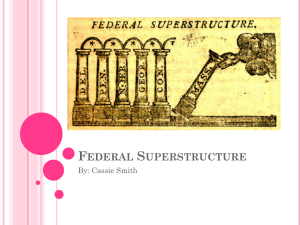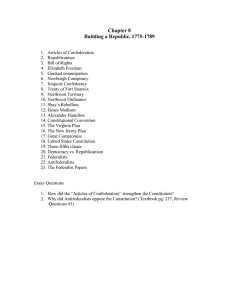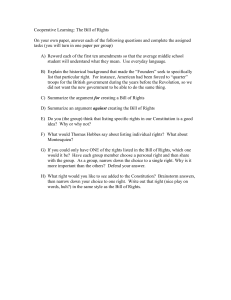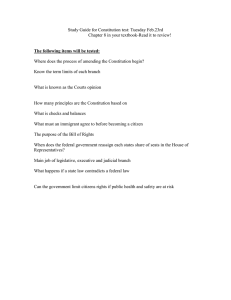Centinel No. 1 (1787) Samuel Bryan (Likely) Historical Background
advertisement
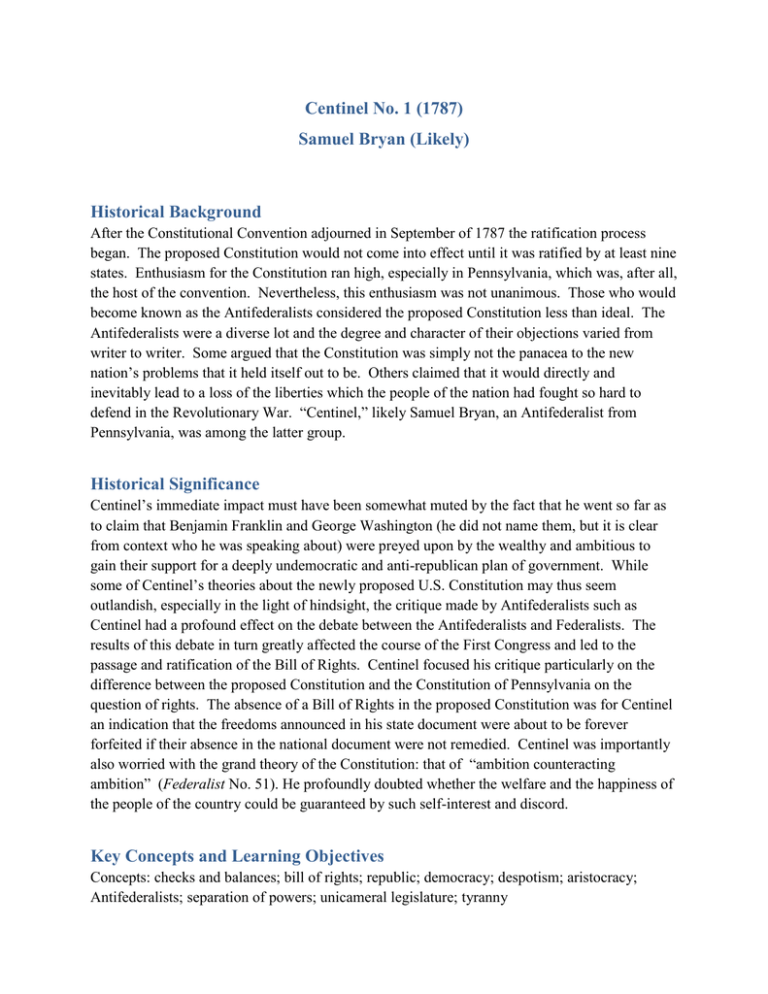
Centinel No. 1 (1787) Samuel Bryan (Likely) Historical Background After the Constitutional Convention adjourned in September of 1787 the ratification process began. The proposed Constitution would not come into effect until it was ratified by at least nine states. Enthusiasm for the Constitution ran high, especially in Pennsylvania, which was, after all, the host of the convention. Nevertheless, this enthusiasm was not unanimous. Those who would become known as the Antifederalists considered the proposed Constitution less than ideal. The Antifederalists were a diverse lot and the degree and character of their objections varied from writer to writer. Some argued that the Constitution was simply not the panacea to the new nation’s problems that it held itself out to be. Others claimed that it would directly and inevitably lead to a loss of the liberties which the people of the nation had fought so hard to defend in the Revolutionary War. “Centinel,” likely Samuel Bryan, an Antifederalist from Pennsylvania, was among the latter group. Historical Significance Centinel’s immediate impact must have been somewhat muted by the fact that he went so far as to claim that Benjamin Franklin and George Washington (he did not name them, but it is clear from context who he was speaking about) were preyed upon by the wealthy and ambitious to gain their support for a deeply undemocratic and anti-republican plan of government. While some of Centinel’s theories about the newly proposed U.S. Constitution may thus seem outlandish, especially in the light of hindsight, the critique made by Antifederalists such as Centinel had a profound effect on the debate between the Antifederalists and Federalists. The results of this debate in turn greatly affected the course of the First Congress and led to the passage and ratification of the Bill of Rights. Centinel focused his critique particularly on the difference between the proposed Constitution and the Constitution of Pennsylvania on the question of rights. The absence of a Bill of Rights in the proposed Constitution was for Centinel an indication that the freedoms announced in his state document were about to be forever forfeited if their absence in the national document were not remedied. Centinel was importantly also worried with the grand theory of the Constitution: that of “ambition counteracting ambition” (Federalist No. 51). He profoundly doubted whether the welfare and the happiness of the people of the country could be guaranteed by such self-interest and discord. Key Concepts and Learning Objectives Concepts: checks and balances; bill of rights; republic; democracy; despotism; aristocracy; Antifederalists; separation of powers; unicameral legislature; tyranny Learning objectives: On completion of this unit, students will be able to: summarize and describe the positions of the Federalists and the Antifederalists on the Constitution; summarize and evaluate arguments for a bill of rights; summarize and evaluate arguments in favor of small republics and of large republics; summarize and evaluate the argument against the theory of ambition counteracting ambition. Questions to Explore Centinel’s argument against the Constitution partakes in a strategy often called “the parade of horribles.” He argues that if the Constitution were adopted a long list of horrible consequences would occur. Would Centinel’s argument be more effective if he made claims as to only a couple of likely negative consequences of adopting the Constitution, rather than listing every possible negative consequence? Why or why not? In general, how important should the rhetorical features of an argument be in evaluating that argument? Explain your answer. Centinel argues that the “jarring [of] adverse interests” is not likely to aid in creating a prosperous or happy republic. He instead argues that the common good can only be obtained in a country consisting of citizens who are virtuous and equal in terms of property. Do you agree with this statement? Why or why not? Compare this statement with those made in Federalist No. 10. Who do you find more persuasive and why? Continuing from the last question, if only a republic consisting of virtuous citizens who have approximately the same level of wealth can truly thrive, what actions can or should the government take to ensure that the people are “virtuous” and “equal”? Centinel argues that the legacy of the Revolutionary War – innovation and less respect for tradition and authority – may make the people too likely to engage in political changes that have unforeseeable consequences. He also says that the reluctance to change present in old communities “accords with reason.” To what extent do you agree or disagree with these two statements? Explain and extend your answer to cover a contemporary issue or community of your choice.

